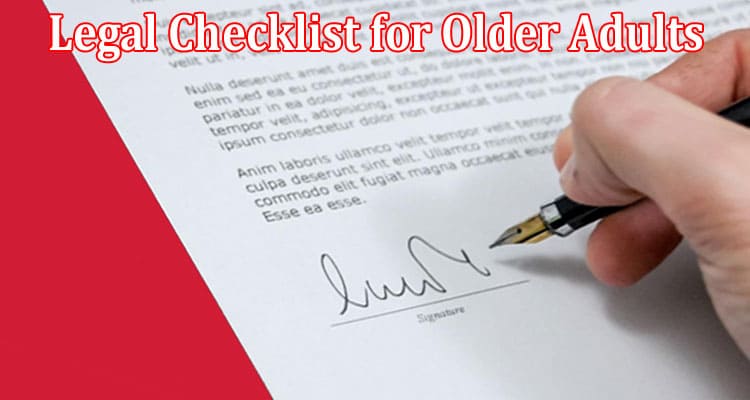Legal Checklist for Older Adults
As we age, it’s important to ensure that our legal affairs are in order to protect ourselves, our families, and our assets. While it may not be the most pleasant topic to think about, in the event of being incapacitated or passing away, having a legal checklist offers reassurance and simplifies things for our family members.
This article will explore 8 essential legal processes in detail, discussing what they are and why they’re important. Whether you’re an older adult looking to get your legal affairs in order or a caregiver looking out for the well-being of a loved one, this legal checklist can serve as a valuable tool to help you navigate the intricacies of aging and legal planning.
1. Estate Planning
Estate planning is managing and distributing an individual’s assets after their passing. It’s essential to have it established to ensure that your will is observed and to minimize taxes. Your will should also include the name of an executor responsible for carrying it out.
One aspect of estate planning is probate, the legal process of settling an individual’s estate. An increasing number of individuals are choosing DIY probate forms as a cost-effective solution. These forms are available online or through probate courts and can be filled out by the executor or personal representative of the estate.
In today’s world, more and more things are becoming digital. Over time, we accumulate significant digital assets, from social media accounts to email and online banking. Therefore, it’s important to include digital assets in your estate planning.
2. Revocable Living Trust
A revocable living trust allows individuals to transfer their assets into a trust during their lifetime. The trust becomes the owner of the assets, and the individual can still control the assets while alive. Upon the individual’s death, the assets are distributed to the trust’s beneficiaries without going through probate. A revocable living trust can be particularly beneficial if you own property in multiple states, as it can help avoid the hustles of probate in each state.
3. Durable Power of Attorney
A durable power of attorney is a legal instrument that authorizes someone else to make financial decisions for you if you are not in the capacity to or have passed away. It ensures that your financial affairs are managed effectively and in accordance with your preferences, even in situations where you are unable to make a decision. By designating a trusted individual as your durable power of attorney, you can have confidence that your financial affairs will be in good hands, regardless of the circumstances.
4. Organ Donation
Organ donation is a personal decision that can be a part of your estate planning. If you want to donate your organs, it’s important to communicate your wishes to your loved ones and ensure they are legally documented. It can be done through a signed organ donor card or by registering as an organ donor through your state’s Department of Motor Vehicles (DMV).
5. Healthcare Power of Attorney
A healthcare power of attorney is a legal instrument that appoints an individual to make medical decisions for you in case you are unable to do so. It’s essential to assign it when you are hale and healthy, so that they consider your preferences for medical treatment if you become incapacitated.
Choosing someone who knows your wishes and will follow them is crucial. It would be best to talk with your designated healthcare power of attorney to ensure they understand your intent and preferences.
6. Living Will
A living will is another legal document that sets out your end-of-life wishes, including whether you want to receive life-sustaining treatment in case you are in a terminal condition or permanent unconsciousness. It is crucial to have a living will to ensure that your desires are honored in case you are unable to express them.
By having a living will in place, you can be at peace knowing that your healthcare decisions align with your personal values and beliefs, and your loved ones won’t have to make difficult decisions during an emotionally challenging time.
7. Deathbed Instructions
Deathbed instructions are a set of guidelines that an individual may provide to their loved ones and healthcare providers as they approach the end of their life. These instructions may include a variety of information, such as preferred comfort measures, spiritual or religious practices, and even funeral arrangements.
These may include a DNR order which is a medical document instructing doctors not to perform CPR if your heart stops or you stop breathing. If you have a terminal illness or a condition that makes it unlikely that CPR will be successful, a DNR order may be appropriate.
8. Life Insurance Policy
A life insurance policy is an agreement between you and an insurance provider, in which the insurer pledges to pay a preselected beneficiary a specified amount of money after your death. It is crucial to have life insurance if you have loved ones solely dependent on your income, or you have financial obligations or debts that you want to provide for after you’re gone.
When purchasing a life insurance policy, it’s crucial to choose a reputable insurer and carefully review the terms and conditions of the policy. You’ll also need to designate a beneficiary who will receive the death benefit in the event of your passing.
Final Thoughts
In 2023, pursuing estate planning, revocable living trust, durable power of attorney, organ donation, healthcare power of attorney, living will, deathbed instructions, and life insurance policy are wise options to be considered during old age. By following this legal checklist of 8 things, older adults can ensure their legal affairs are in order, and their wishes are respected. By having a plan in place and taking steps to protect themselves, they can enjoy their golden years with peace of mind. It’s also vital to seek the advice of a qualified attorney to ensure that their legal documents are valid and enforceable.




